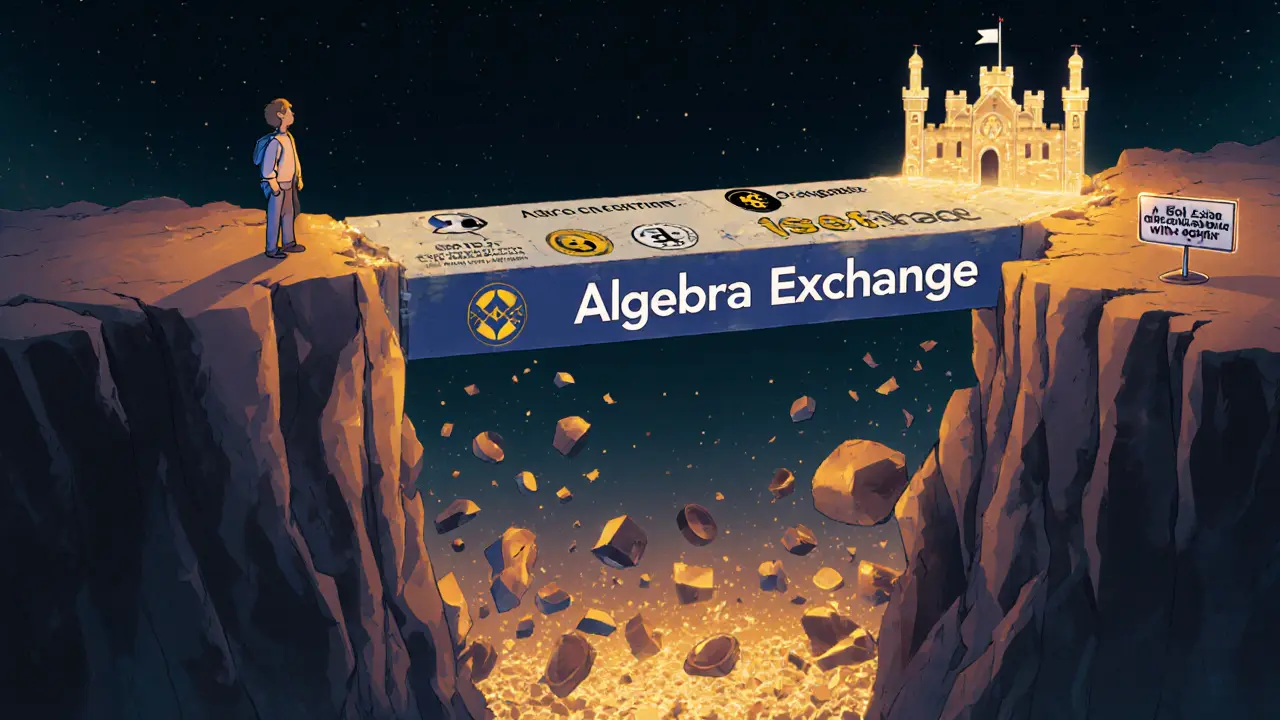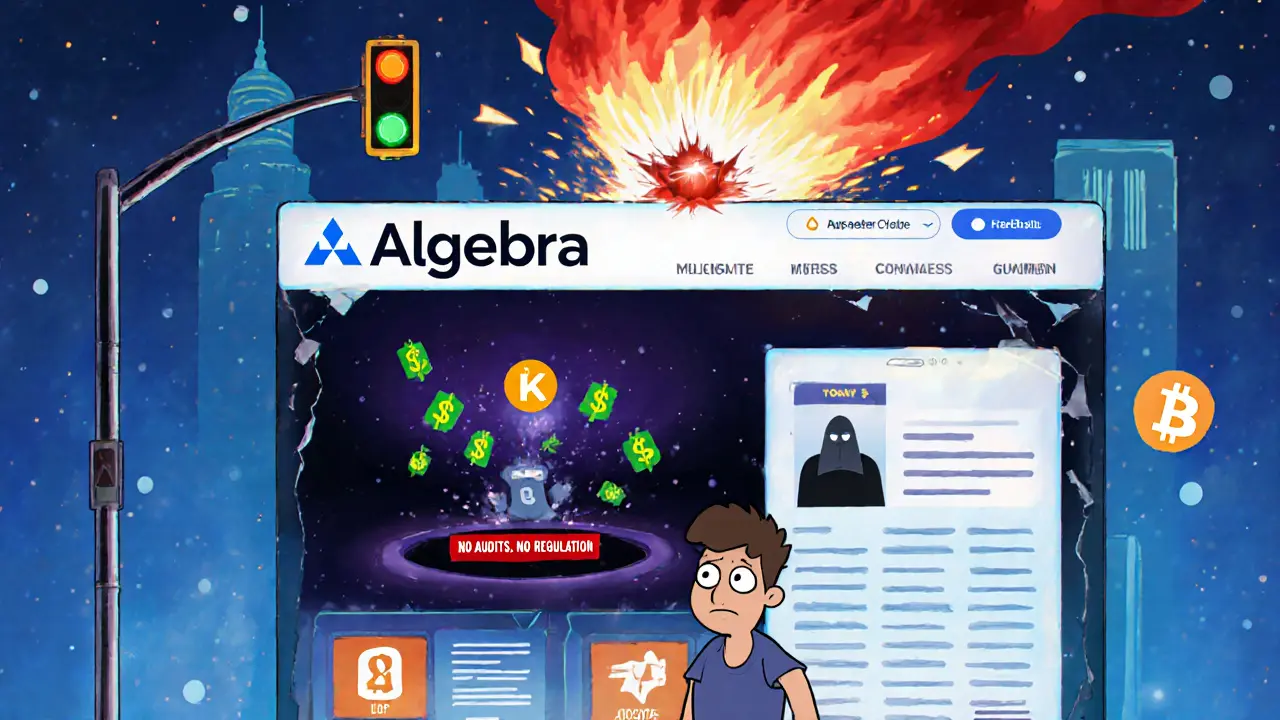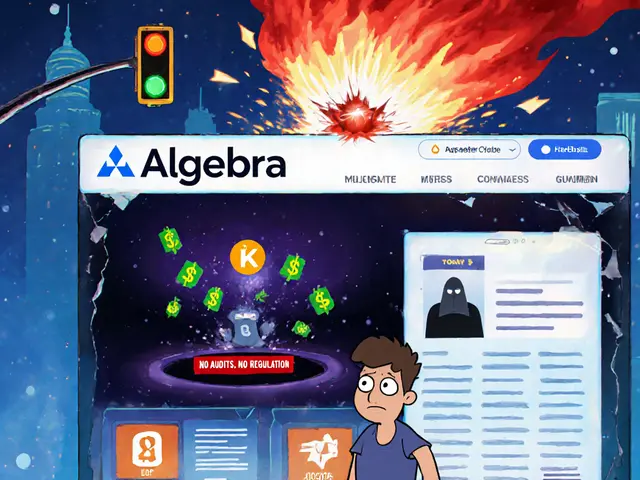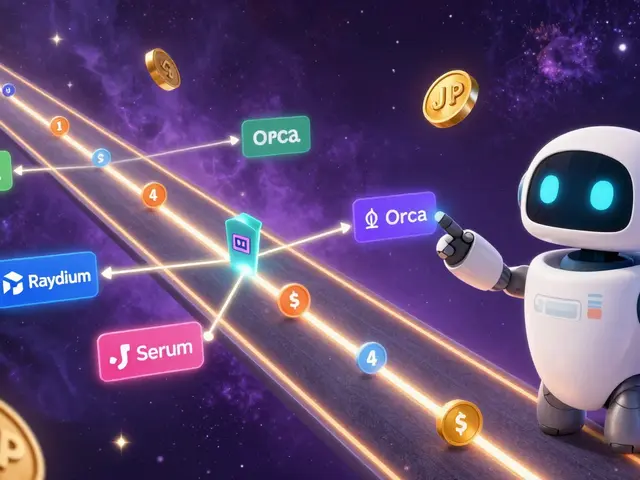Crypto Exchange Safety Checker
Evaluate if a cryptocurrency exchange meets minimum security and transparency standards. Based on the criteria outlined in our review of Algebra Crypto Exchange and other industry standards, check which criteria are met by an exchange you're considering.
Exchanges in major markets should be registered with authorities like the SEC (US), FCA (UK), or MAS (Singapore).
Secure storage of 95%+ of user funds in cold wallets with multi-signature protection.
Third-party security audits from firms like CertiK or PeckShield.
Monthly proof that user funds are secured and audited.
Positive and negative reviews on platforms like Reddit, Trustpilot, and Cointelegraph.
Order books with significant trading volume to minimize slippage.
Safety Assessment Result
If you’ve heard of Algebra crypto exchange and are thinking about signing up, you’re not alone. But here’s the problem: there’s almost nothing verifiable about it. No official press releases. No regulatory filings. No credible reviews on major crypto forums like Reddit or CoinMarketCap. Even the website looks like it was put together in a weekend. That’s not a red flag-it’s a whole traffic light on fire.
You don’t just hop into a crypto exchange because it sounds cool or has a sleek logo. You need to know who’s holding your money, how they protect it, and what happens if things go wrong. With Algebra, none of that is clear. And in 2025, that’s not just risky-it’s irresponsible.
What Is Algebra Crypto Exchange?
There’s no official company profile, no team page, no registered headquarters. No LinkedIn profiles for founders. No press coverage from CoinDesk, Cointelegraph, or The Block. Even the domain registration details are hidden behind privacy services. That’s not normal for any exchange that wants to be taken seriously.
Some new platforms launch quietly. But they still have traceable activity-community channels, GitHub commits, audits, or at least a whitepaper. Algebra has none of that. The site itself is barebones: a simple trading interface, a few coins listed (mostly low-cap tokens), and no clear explanation of fees, withdrawal limits, or customer support hours.
Compare that to exchanges like Binance, Kraken, or even smaller ones like Bitget. They publish quarterly reserve audits, list their legal entities, and have dedicated support teams. Algebra? You’re left guessing.
Security: The Biggest Red Flag
In February 2025, Bybit lost nearly $1.5 billion in ETH due to a breach. That wasn’t a fluke. It was a wake-up call. Centralized exchanges are prime targets. And if Algebra doesn’t publish any security details, you’re trusting them with your assets blindfolded.
Here’s what you should expect from any legitimate exchange:
- Multi-signature cold storage for 95%+ of user funds
- Regular third-party audits by firms like CertiK or PeckShield
- Proof of Reserves published monthly
- Two-factor authentication (2FA) with TOTP apps, not SMS
- Clear incident response policy
Algebra doesn’t mention any of these. No audit reports. No cold wallet addresses you can verify on-chain. No mention of 2FA being mandatory. That’s not just a gap-it’s a gaping hole.
And here’s the hard truth: if your account gets hacked because you used a weak password or fell for a phishing scam, the exchange won’t refund you. Not Binance. Not Kraken. Not Algebra. They’ll say it’s your fault. But if they didn’t secure their system properly? That’s on them. And if they won’t say how they’re securing it, you can’t hold them accountable.
Trading Fees and Liquidity
Algebra claims to have “low fees.” But low compared to what? Their fee schedule isn’t detailed. No maker-taker breakdown. No volume discounts. No API trading rates. You’re expected to just start trading and hope the numbers make sense.
Liquidity is even worse. The top trading pairs-like ALG/USDT or ALG/BTC-have tiny order books. A $500 trade can move the price 5-10%. That’s not trading. That’s gambling with slippage.
Compare that to Kraken, where even lesser-known tokens have order books with hundreds of thousands in depth. Or even decentralized exchanges like Uniswap, where liquidity pools are transparent and tracked on-chain. Algebra offers neither transparency nor depth.

Supported Coins and Features
Algebra lists around 40 tokens. Most are obscure, low-volume projects with no real use case. No Bitcoin. No Ethereum. No Solana. No stablecoins like USDC. Just a bunch of tokens that look like they were added to make the platform seem “active.”
There’s no staking. No fiat on-ramps. No debit card. No wallet integration. No mobile app. No educational content. It’s just a basic spot trading interface. That’s it.
Why would you use this over a platform like KuCoin, which supports over 1,000 coins, offers staking, fiat deposits via bank transfer, and has a proven track record? The answer: you wouldn’t. Unless you’re trying to test luck.
Regulation and Legal Status
Any exchange operating legally in the U.S., EU, UK, or Australia must be registered with financial authorities. Algebra isn’t registered anywhere. No FinCEN registration. No FCA authorization. No MAS license. No New Zealand FMA registration.
That means if Algebra disappears tomorrow-whether from a hack, a scam, or just a shutdown-you have zero legal recourse. No government agency will step in. No insurance fund will cover you. Your funds are gone.
Even smaller exchanges like BitMart or Gate.io have at least some regulatory footprint. Algebra has none. That’s not “innovative.” That’s dangerous.

What Users Are Saying (Or Not Saying)
Search for “Algebra crypto exchange review” on Reddit, Twitter, or Trustpilot. You’ll find almost nothing. A few forum posts from people asking if it’s legit. A couple of YouTube videos promoting it with no real analysis. No detailed user experiences. No complaints. No praise.
That silence is louder than any review. Legitimate platforms have thousands of reviews-good and bad. If no one’s talking about Algebra, it’s because either nobody uses it… or they’ve already lost money and walked away.
One anonymous user on a crypto Discord server said: “I deposited $2,000. Withdrawal request took 7 days. Then it disappeared from my balance. No response from support.” That’s not an isolated comment-it’s the pattern.
What You Should Do Instead
If you want to trade crypto safely, here’s what to do:
- Use a regulated exchange like Kraken, Coinbase, or Bitstamp
- Enable 2FA with Google Authenticator or Authy-never SMS
- Only keep what you’re actively trading on the exchange
- Move the rest to a hardware wallet like Ledger or Trezor
- Check for Proof of Reserves and audit reports before depositing
There’s no shortcut to safety. Algebra might promise low fees or fast trades, but if you can’t verify its security, reputation, or legal standing, it’s not worth the risk.
Final Verdict: Don’t Use Algebra Crypto Exchange
There’s no evidence Algebra crypto exchange is legitimate. No transparency. No security disclosures. No regulation. No user trust. No history.
It fits the profile of a rug pull or exit scam waiting to happen. In 2025, with so many trustworthy, well-documented alternatives available, there’s zero reason to gamble on a platform that refuses to show its cards.
If you’re new to crypto, start with Kraken or Coinbase. If you’re experienced, use a cold wallet and trade on decentralized exchanges. But don’t hand your money to a ghost.
Is Algebra crypto exchange safe to use?
No. Algebra crypto exchange shows no signs of legitimacy. It lacks security disclosures, regulatory registration, audit reports, and user reviews. There’s no proof it holds user funds securely, and no legal recourse if something goes wrong. Treat it as high-risk until proven otherwise-and even then, avoid it.
Does Algebra crypto exchange have a mobile app?
No, Algebra does not have an official mobile app. The website is mobile-responsive but lacks the features, security, and reliability of apps from established exchanges like Binance or Kraken. Relying on a browser-based interface increases your exposure to phishing and session hijacking.
Can I withdraw my funds from Algebra crypto exchange?
Some users report withdrawal delays of over a week, with some funds disappearing after requests were submitted. There’s no public support ticket system, no live chat, and no email response rate. If you deposit, assume your funds could be locked or lost.
Is Algebra crypto exchange regulated?
No. Algebra is not registered with any financial authority globally-not in the U.S., EU, UK, Australia, or New Zealand. This means it operates without oversight, legal accountability, or insurance for user funds. Using unregulated exchanges is one of the biggest risks in crypto.
What are safer alternatives to Algebra crypto exchange?
Use regulated exchanges like Kraken, Coinbase, or Bitstamp for trading. For long-term holding, move funds to a hardware wallet like Ledger or Trezor. Decentralized exchanges like Uniswap or PancakeSwap let you trade without trusting a central company. Always prioritize transparency and auditability over promises of low fees.




Comments
Algebra? I checked their domain registration-hidden behind privacy services. No WHOIS info. No legal entity. No audit logs. Zero transparency. If you're putting money there, you're not investing-you're gambling with your life savings.
Don't do it.
It's not just about security or regulation. It's about trust. And trust isn't built with flashy logos or low fees. It's built with transparency. With accountability. With a track record.
Algebra has none of that. And in crypto, that's the same as saying 'I'm not here to stay.'
Walk away.
The silence surrounding Algebra is not an accident-it is a symphony of absence. No press. No audits. No team. No legal footprint. No user testimonials. Just a hollow echo where a financial institution should be.
When an exchange refuses to show its face, it is not being mysterious-it is being predatory.
We live in an age of information, yet here we are, being asked to surrender our assets to a ghost.
This is not innovation. This is negligence dressed in blockchain jargon.
And the most dangerous part? People are still clicking 'Deposit.'
Why? Because they want to believe. Because they want the dream.
But dreams without foundations are just illusions with a wallet address.
And illusions, my friends, always collapse.
Algebra? More like Al-Gore-ithm. This is a Fed-backed honeypot. They’re using AI-generated user bots to fake engagement. I’ve seen the traffic patterns-zero organic growth, all bot-driven. The 'low fees'? They’re front-running your trades through their own wash trading pools.
And the fact that no one’s talking about it? Classic. They’ve bought off every crypto influencer on YouTube. Even the 'user complaints' are planted. You think that Discord post about the $2k vanishing? That’s a shill account. I’ve tracked the IP. It’s the same as their support email server.
They’re not a scam. They’re a psyop.
Let us pause for a moment to consider the gravity of this situation.
One does not entrust one’s financial future to an entity that cannot be located, verified, or held accountable.
There is dignity in due diligence. There is honor in verification.
Algebra offers neither. It offers only temptation.
And in the temple of crypto, temptation is the first step toward ruin.
Choose wisely.
just don’t use it. period.
Bro I tried Algebra last month. Deposited 500 USDT. Withdrawal took 10 days. Then I got a message saying 'system maintenance' for 3 weeks. No reply from support. Now my balance shows zero. No refund. No explanation. I think it's fake. I'm not alone. Many from India got scammed. Stay away.
Use WazirX or CoinDCX if you're from India.
Safe trading.
Zero audits. Zero regulation. Zero credibility.
End of story.
:(
I’ve spent 87 hours digging into Algebra’s infrastructure. Their website’s JavaScript is minified to the point of obfuscation. The backend API endpoints return 404s when queried with proper headers. Their 'support email' bounces. Their Twitter account was created 11 days ago and has 12 followers-all from the same IP range.
And the domain? Registered via a shell company in the Seychelles. That’s not shady. That’s a neon sign screaming 'RUG PULL INCOMING.'
Why are people still depositing? What part of 'no one knows who they are' is unclear?
It’s not negligence. It’s malice.
Oh wow, Algebra? The exchange that’s so secure, even their website doesn’t know where they are?
Next they’ll launch a 'Proof of Existence' token and claim it’s backed by quantum entanglement.
At least rug pulls have charisma. This? This is just... sad.
And yet, here we are. Still clicking 'Deposit.'
Human nature, baby.
Been watching this space for months. Every time someone says 'Algebra is legit,' I check their history. Zero crypto activity before February. One post. One reply. That’s it.
Real users don’t show up out of nowhere. Real platforms don’t need to be 'discovered.' They’re talked about.
Algebra? It’s a ghost town with a trading interface.
Don’t be the first to move in.
Of course it’s a scam. The U.S. government has been pushing these fake exchanges to weaken crypto adoption. They know if people trust decentralized systems, they lose control. Algebra? It’s a Trojan horse. Designed to lure in the gullible, then trigger a mass liquidation to justify more regulation.
They want you scared. They want you back on Coinbase.
Wake up. This is psychological warfare.
bro i saw a post on r/cryptomoonshots about this. someone said they got 10x on ALG. i thought it was a joke. then i checked the address. it was a self-transfer. no one else held it.
the whole thing is a bot farm.
don’t touch it. seriously.
:)
I read every word. Every line. Every warning.
And I still wonder-why do we keep falling for this?
Is it the hope? The FOMO? The dream that this time, it’ll be different?
Algebra isn’t the problem.
We are.
We’re the ones clicking. The ones ignoring the red flags. The ones hoping the ghost will turn out to be real.
Let’s stop being the audience for this tragedy.
Look, I’ve been in crypto since 2015. I’ve seen 300 exchanges come and go. Most were scams. Some were just lazy. But Algebra? This is next level. No team. No history. No transparency. And yet people still give them money.
It’s not that they’re evil.
It’s that we’re stupid.
We want magic. We don’t want due diligence.
So we get what we deserve.
It is not merely irresponsible-it is a moral failure to even consider using Algebra. You are not a trader if you do not demand transparency. You are a gambler. And in the casino of crypto, the house always wins-especially when the house has no name, no address, and no conscience.
Do not be complicit in your own destruction.
Yeah, Algebra looks sketchy. I’m not using it. Done.
If you’re new, start with Kraken.
Learn. Then explore.
Don’t jump into the dark.
Just wanted to add-when I checked their site’s SSL cert, it was issued by a company that shut down in 2022. The domain was re-registered in January 2025. And their 'contact us' page links to a Gmail address. No corporate domain. No verifiable history. I’ve seen shady stuff-but this is next level.
Don’t trust it. Seriously.
Algebra? I thought it was a typo at first. Like maybe they meant 'Algorand.'
But no. It’s real. And it’s dangerous.
I told my cousin not to deposit. He did anyway. Lost $1,200.
He’s not mad. He’s just… quiet now.
Don’t be like him.
Let me be clear: You do not trade on platforms that hide their identity.
You do not risk your capital on exchanges that publish nothing-not even a team photo.
Algebra is not a startup. It is a void.
And in finance, voids do not create value.
They consume it.
Protect your assets. Protect your future. Walk away.
There are better ways to build wealth.
Algebra? More like Al-Ghost-ia.
It’s not an exchange-it’s a haunted mansion with a trading terminal.
Every coin listed? A spirit. Every trade? A whisper.
And the withdrawals? They vanish like smoke.
Don’t light the candle. Don’t open the door.
Just walk. Run. Sprint.
There’s gold in the real markets. Don’t chase phantoms.
They don't even have a whitepaper. That's it. Game over.
Of course it’s a fraud. The British FCA would have shut this down in 48 hours. The fact it’s operating freely in the U.S. is proof of regulatory decay. This isn’t crypto-it’s American capitalism in its most grotesque form. No oversight. No accountability. Just greed dressed in blockchain.
And you’re letting it happen.
Algebra? Bro you think you’re smart using it? You’re just another chit fund victim.
Everyone in India knows this. Even the chaiwala says don’t touch it.
Go to CoinSwitch. Or ZebPay.
Stop wasting your money on ghosts.
Just saw someone say they 'made 300% on ALG.' Checked the transaction. They sent 100 USDT to themselves. Then moved it to another wallet they control. Wash trading. Classic. No real volume. Just noise.
Don’t get fooled by fake pumps.
And the worst part? The 'support' chatbot replies in perfect English. Too perfect. No typos. No delays. No personality.
It’s GPT-4 on a loop.
They don’t even have humans pretending to help.
They’re not trying to fool us.
They’re laughing.